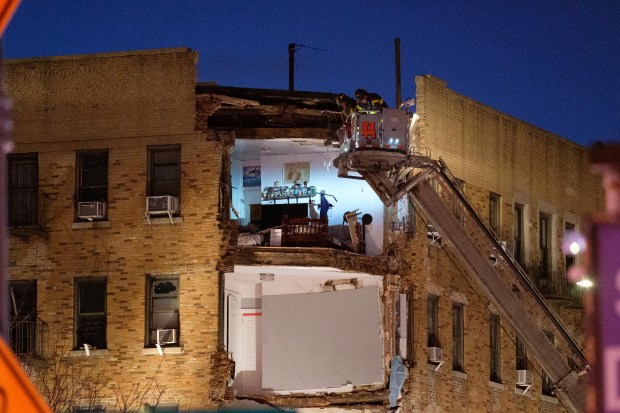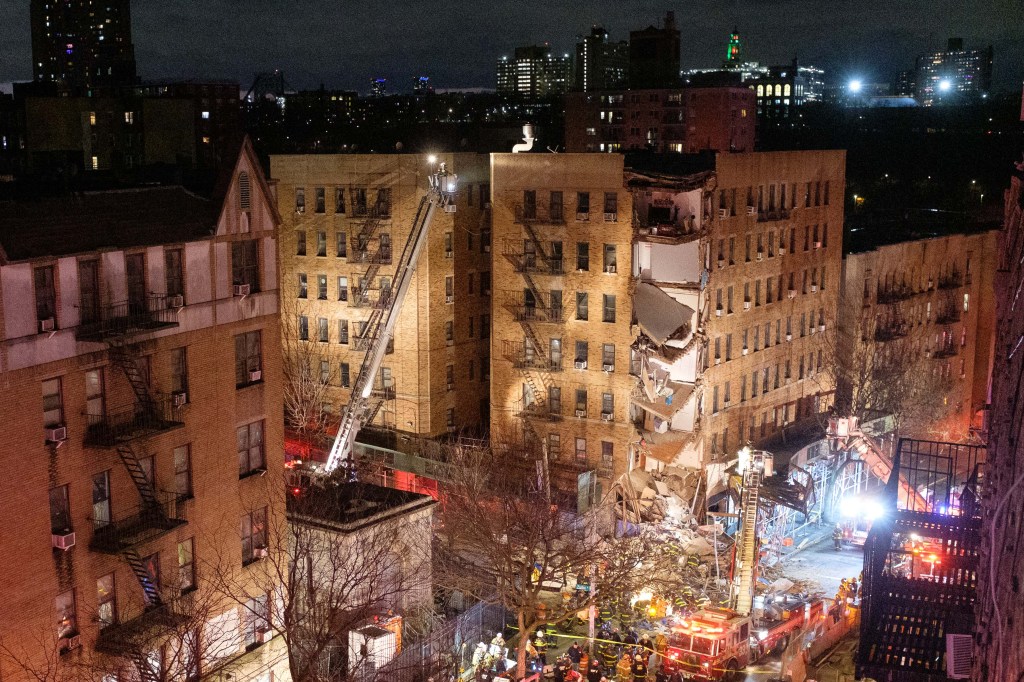The petrifying partial collapse of a 96-year-old apartment building in the Bronx has generated a push by two New York congressmen for stronger safety regulations in buildings that receive federal funding.
Reps. Adriano Espaillat and Ritchie Torres plan to introduce a regulatory legislative package on Friday aimed at buildings like the one in the Bronx, which received a federal tax credit, according to the offices of the two Bronx Democrats.
The corner of the brick Bronx structure, located at 1915 Billingsley Terrace in Morris Heights, collapsed last week, killing none but displacing scores of people at the holidays and raising serious questions about the structural integrity of the city’s aging housing stock.

The legislative package would create a national inspection program for apartment buildings that are beneficiaries of federal assistance, and would impose steep fines on certain landlords who fail to adhere to new self-review and reporting guidelines, according to the lawmakers’ offices.
Torres’ bill, titled the Building Collapse Prevention Act, would provide the Department of Housing and Urban Development with a one-year window to build a program for a U.S. standards agency to inspect federally funded residential buildings. The National Institute of Standards and Technology would carry out the inspections.
The bill’s reach would include buildings with low-income tenants who use a voucher program known as Section 8, and buildings with elderly tenants who use a program called Section 202.
“The federal government is the principal funder of affordable housing in the country,” Torres said in an interview. “And therefore, we in the federal government have a vested interest in ensuring that affordable housing is structurally sound and that the people who live there are physically safe.”

Espaillat’s legislation would introduce new regulations for recipients of benefits under the Low-Income Housing Tax Credit program, which disburses some $9 billion annually for low-income rental housing. The collapsed building has been a beneficiary of the program and is located in Espaillat’s district.
Under his bill, the LIHTC Landlord Accountability Act, landlords would be required to submit yearly reports on their buildings’ structural condition, and would face individual fines of $500,000 for noncompliance with the self-reporting rules.
The congressmen also turned their attention to city oversight, which has been under scrutiny since the collapse. In a Thursday letter to city Buildings Department Commissioner James Oddo they asked for a “list of structurally unsound, unstable, and defective buildings broken down by neighborhood.”

The letter also requested a report on measures the city is taking to prevent repeats of the collapse, and advice on how the federal government can assist. And it requested a probe of any role a nearby water main project may have played in the collapse.
“This tragic incident underscores the critical need for a proactive and vigilant approach to building safety and code enforcement,” said the letter.
The Buildings Department said it had received the letter and was working on a response to the lawmakers.
“DOB engineers are continuing to monitor the ongoing work performed by the landlord to make repairs inside of the damaged building, so that the tenants can safely return,” Andrew Rudansky, a department spokesman, said in a statement. “We are grateful to have partners in Congress like Rep. Espaillat and Rep. Torres who are similarly focused on building safety.”
The city has not established the cause of the collapse.
But an ongoing inquiry by the Buildings Department found that an engineer tasked with inspecting the building as it underwent renovation this year misidentified a support column as a decorative column.
The city said last week that it had stripped the engineer of his authority to inspect exterior building walls.

Gardiner Anderson for New York Daily News
The building had been flagged for more than 100 building violations, according to city records. (Gardiner Anderson for New York Daily News)
The office of Bronx District Attorney Darcel Clark has also opened a criminal investigation into the collapse. The 47-unit building has a checkered history of complaints and violations.
David Kleiner, the building’s manager, has said the building was in “perfect condition” and was “just upgraded” before the collapse.
“I don’t think there’s any criminality,” he said last week, but added that the Bronx district attorney’s office is “welcome to check.”
